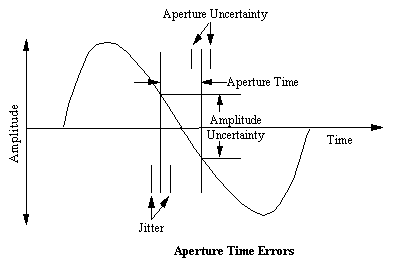In an A/D converter, the sample-and-hold circuit would ideally take zero time to determine the level of the signal waveform and to hold this level until the next sample is called for. However, it takes a finite time to charge the holding capacitor in the sample-and-hold circuit, and this is called the aperture time. Because the time required to establish a new value of charge depends on the amount of change in the signal level from one sample to the next, the aperture time will vary with the rate of change in signal level, increasing for high-level, high-frequency signals. The starting time of the sampling aperture is also slightly uncertain, and this is called jitter. In other words, lack of precision in the sampling time leads to amplitude errors in rapidly changing signals. The errors involve aperture time, uncertainty in aperture time, and jitter. The result is distortion of the sampled signal which rises with frequency.
